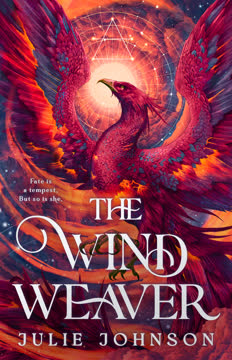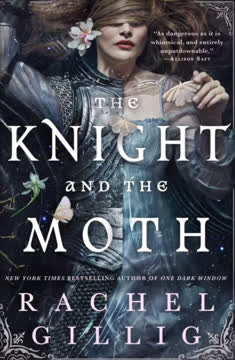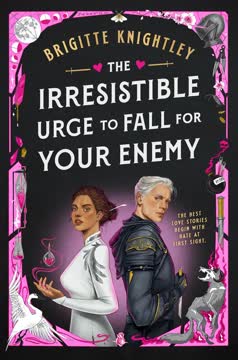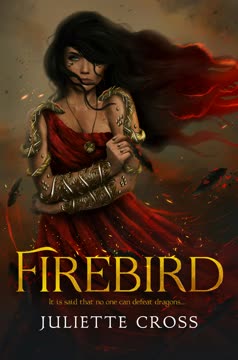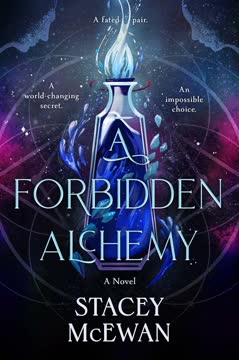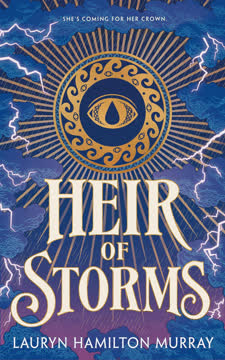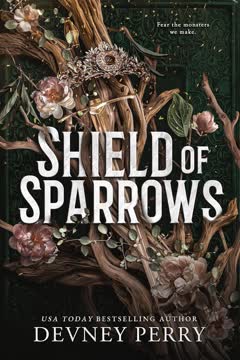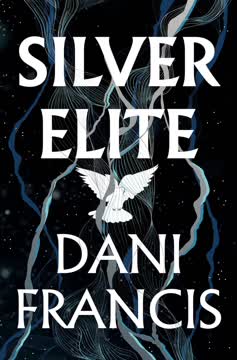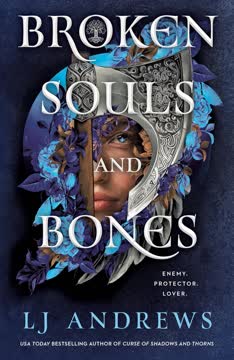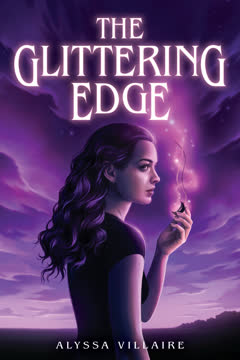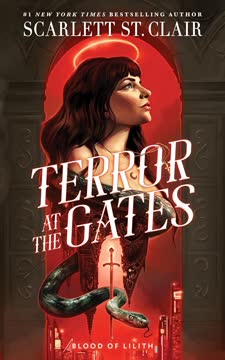Plot Summary
The Noose and the Mark
Rhya Fleetwood, a halfling with fae blood, faces execution at the hands of human soldiers in a world where fae and their descendants are hunted. Bound to a tree, bruised and starved, she listens to her captors' cruelty and prejudice, her only comfort the memory of her mentor Eli's teachings. The soldiers discuss her as if she's less than human, and Rhya's rage and despair simmer beneath her exhaustion. She is marked by a strange, dark birthmark on her chest—a secret she's always been told to hide. As the noose tightens, she steels herself for death, her spirit unbroken even as her body fails.
The Wolf in the Camp
Commander Scythe, a mysterious, terrifying figure, arrives to oversee Rhya's execution. He recognizes the mark on her chest as something dangerous and, in a shocking turn, slaughters the entire company of soldiers who captured her. Instead of freeing her, he claims her as his own prisoner, binding her to his horse and dragging her away from the carnage. Rhya, battered and confused, realizes she's exchanged one captor for another—one who is even more inscrutable and dangerous, but who seems to have a purpose for her beyond simple execution.
Flight Across the Wilds
Rhya is dragged across the wilds, half-starved and feverish, by Scythe. He is cold, efficient, and unyielding, but he keeps her alive, tending to her wounds and forcing her to eat and drink. As they travel, Rhya's anger and fear war with a growing curiosity about her captor's motives. She learns to survive on scraps of food and moments of rest, her body slowly healing even as her spirit remains wary. The landscape shifts from marsh to forest to mountain, and the threat of pursuit by other soldiers looms ever-present.
Fever, Chains, and Mercy
Rhya's fever worsens, and she drifts in and out of consciousness. Scythe, despite his gruffness, tends to her with a surprising gentleness, removing her shackles and nursing her through the worst of her illness. In a rare moment of vulnerability, Rhya glimpses the man beneath the armor—a protector as much as a captor. When she recovers, she is given a chance to bathe and dress in clean clothes, a small mercy that feels monumental after so much suffering. Yet, the power dynamic remains: she is still his prisoner, and his intentions are still a mystery.
The Reluctant Alliance
As they continue north, Rhya and Scythe's relationship shifts from outright hostility to a grudging partnership. He provides her with food, healing salve, and even moments of warmth, but refuses to answer her questions about their destination or his true allegiance. Rhya, stubborn and resourceful, pushes back, demanding respect and information. Their banter is sharp, but beneath it lies a growing mutual recognition of each other's strength and pain. The journey is perilous, with threats from both the environment and the soldiers who hunt them.
Bridge of Blood and Wind
At a rickety bridge over a chasm, they are ambushed by soldiers. In the chaos, Rhya's latent power erupts—she unconsciously calls the wind to save herself from falling, the mark on her chest burning with cold fire. Scythe is wounded, and Rhya, despite her fear, helps him escape. Together, they sever the bridge, sending their pursuers to their deaths. The violence and Rhya's display of power leave both shaken. For the first time, Rhya realizes she is more than a victim—she is something dangerous, something hunted for a reason.
The Monster and the Girl
After the massacre at the bridge, Rhya and Scythe confront the morality of their actions. Rhya is haunted by the deaths, even of her enemies, while Scythe insists that survival requires hard choices. When Scythe is gravely wounded, he is forced to ask for Rhya's help. She sets aside her anger to tend his wounds, and in the intimacy of the moment, they both reveal more of themselves. Rhya's skills as a healer and her compassion surprise Scythe, while his vulnerability hints at a past full of pain and regret.
Into the Northlands
They reach the border of the Northlands, where Scythe's true identity is revealed: he is Prince Pendefyre, the Remnant of Fire, heir to the throne of Dyved. Rhya is thrust into a world of fae politics, ancient grudges, and new allies. She meets Jac and other members of the Ember Guild, who are both wary and protective. The Northlands are not the safe haven she hoped for—danger follows her, and her mark is recognized as a Remnant, a sign of elemental power. The prophecy of the tetrad—four Remnants who can restore the balance of the world—begins to take shape.
Secrets in the Shadows
In the palace of Caeldera, Rhya is introduced to Queen Vanora and the treacherous world of court. She is both a guest and a prisoner, watched by allies and enemies alike. As she navigates the politics of the palace, she learns more about the prophecy, the history of the Cull, and the fate of previous Remnants. The bond between her and Penn deepens, complicated by guilt, longing, and the shadow of Penn's past with another wind weaver, Enid. Rhya's own past—her abandonment, Eli's death, and her survival—haunt her as she tries to find her place in this new world.
The Remnant Revealed
Rhya's power continues to grow, and with it, her understanding of what it means to be a Remnant. She learns to sense the bond between herself and Penn, and glimpses the possibility of channeling and merging their powers. Soren, the Remnant of Water and King of Llŷr, arrives, offering both guidance and temptation. He reveals the true nature of the tetrad and the prophecy: only when all four Remnants are united can the blight be ended and the world restored. Rhya must choose whether to embrace her destiny or run from it.
The Palace of Ash
Life in Caeldera is both a refuge and a crucible. Rhya finds friendship with Carys, Uther, and the Ember Guild, and for the first time, a sense of belonging. Yet, the threat of Efnysien and the Reavers grows ever closer. Betrayal strikes from within when Gower, a trusted lieutenant, kidnaps Rhya in hopes of trading her for immortality. Rhya is forced to kill to survive, and the weight of her actions threatens to break her. The palace, once a symbol of safety, becomes a place of mourning and reckoning.
The Queen's Court
At the Fyremas festival, Rhya is paraded before the court, subjected to Vanora's scorn and the scrutiny of the nobility. She is both celebrated and reviled, her power both a blessing and a curse. The festival is a riot of color and joy, but beneath the surface, tension simmers. Rhya's relationships with Penn, Soren, and the Ember Guild are tested as old wounds and new threats collide. The prophecy looms ever larger, and Rhya must decide who she can trust—and who she must become.
The Festival of Fire
As Fyremas reaches its climax, Rhya and Penn are drawn together by a force neither can resist. Their passion ignites, breaking through the walls of fear and guilt that have kept them apart. Yet, even in their union, danger encroaches. Soren arrives with dire news: the Reavers and Efnysien's red army are marching on Caeldera. The city's wards are under attack, and the festival turns to chaos as the enemy breaches the gates. Rhya and Penn must set aside their personal struggles to face the coming storm.
Betrayal in the Night
The city is plunged into battle as the Reavers and Efnysien's forces invade. The wards fall, and the palace is besieged. Rhya, Penn, Soren, and the Ember Guild fight desperately to defend Caeldera. The cost is staggering: friends and innocents die, the palace is destroyed, and the city is left in ruins. Rhya's power is pushed to its limits as she faces the ice giants and the full fury of the enemy. In the crucible of war, she is forced to embrace her identity as the wind weaver, the Remnant of Air.
The Storm Unleashed
In the battle's climax, Rhya unleashes the full force of her power, calling lightning and wind to destroy the giants and save the city. The effort nearly kills her, but with Soren's help, she survives. The aftermath is a landscape of ash and grief: Uther is dead, Vanora is gone, and the survivors must reckon with all they have lost. Rhya is hailed as a savior, but the weight of her actions and the prophecy bear down on her. The bond between her and Penn is tested by guilt, longing, and the knowledge that their fight is far from over.
The Battle for Caeldera
As dawn breaks over the ruined city, Rhya and Penn mourn their dead and begin the work of rebuilding. Penn, now king, vows vengeance against Efnysien and the Reavers. Soren departs to rally his own forces, the alliance between Dyved and Llŷr stronger than ever. Rhya, changed by all she has endured, stands at the threshold of a new life—no longer a fugitive, but a hero and a leader. The prophecy of the tetrad remains unfulfilled, but hope flickers in the ashes. Together, they face an uncertain future, bound by love, loss, and the promise of a world remade.
Characters
Rhya Fleetwood
Rhya is a halfling marked by a mysterious birthmark, orphaned and raised by the healer Eli. Her life is defined by flight, loss, and the constant threat of death in a world that despises her kind. Fiercely independent, stubborn, and compassionate, she is both a healer and a fighter, shaped by trauma but unwilling to surrender her humanity. Her journey is one of self-discovery: from victim to survivor, from fugitive to Remnant. The awakening of her power as the wind weaver forces her to confront her fears, her guilt, and her destiny. Her relationships—with Penn, Soren, and her found family—are fraught with longing, trust, and betrayal. Rhya's greatest struggle is not with her enemies, but with herself: learning to accept her power, her past, and her right to shape the future.
Penn (Pendefyre, Commander Scythe)
Penn is a study in contradictions: a prince who hides as a soldier, a killer with a code, a leader haunted by guilt. His past is scarred by loss—most notably the death of Enid, the previous wind weaver, for which he blames himself. He is driven by duty, self-control, and a desperate need to protect those he loves, even at the cost of his own happiness. His relationship with Rhya is a slow-burning fire, marked by tension, denial, and eventual surrender. As the Remnant of Fire, his power is both a gift and a curse, threatening to consume him if he loses control. Penn's journey is one of learning to trust, to forgive, and to accept that vulnerability is not weakness. As king, he must balance vengeance with mercy, and love with responsibility.
Soren (King Soren of Llŷr)
Soren is the enigmatic, charismatic ruler of Llŷr, the Remnant of Water, and Penn's former friend turned rival. He is both mentor and provocateur to Rhya, offering her guidance in wielding her power and tempting her with the possibility of a different path. Soren's history is marked by betrayal, loss, and a deep cynicism about the world and the prophecy. He is a master of control, wielding his power with effortless grace, but beneath his charm lies a well of pain and loneliness. His relationship with Penn is fraught with old wounds, and his interest in Rhya is both personal and political. Soren represents the allure of power without restraint, and the danger of losing oneself to cynicism.
Carys
Carys is a dressmaker and the wife of Uther, a member of the Ember Guild. She becomes Rhya's first true friend in Caeldera, offering warmth, humor, and a sense of belonging. Her pregnancy and the birth of her son Nevin are symbols of hope and renewal in a world scarred by loss. Carys's strength lies in her practicality, her loyalty, and her ability to find joy even in hardship. Her friendship with Rhya is a lifeline, grounding both women in the midst of chaos. The loss of Uther is a devastating blow, but Carys's resilience and love for her child offer a vision of healing and the possibility of a future rebuilt from ashes.
Uther
Uther is a lieutenant of the Ember Guild, known for his calm, steady presence and unwavering loyalty. He is both a warrior and a family man, devoted to Carys and their newborn son. Uther's death in the collapse of the palace is a turning point for Rhya and the survivors of Caeldera, a reminder of the cost of war and the fragility of hope. His legacy endures in the lives he touched and the family he leaves behind, a symbol of the sacrifices made in the fight for a better world.
Jac
Jac is a member of the Ember Guild, known for his humor, charm, and unwavering support of Rhya. He provides levity in dark times, but beneath his banter lies a fierce loyalty and a willingness to fight for those he loves. Jac's friendship with Rhya is uncomplicated and genuine, a reminder that family can be chosen as well as born. He is a bridge between the world of soldiers and the world of court, helping Rhya navigate both with grace and good humor.
Farley
Farley is a red-haired archer of the Ember Guild, injured in battle but determined to remain useful. His resilience and wit make him a valuable ally, and his friendship with Rhya is marked by mutual respect and shared trauma. Farley's journey from wounded soldier to survivor mirrors Rhya's own, and his presence in the story is a testament to the power of perseverance and the importance of found family.
Cadogan
Cadogan is a high-ranking member of the Ember Guild, tasked with Rhya's protection. He is quiet, observant, and fiercely competent, providing a steady presence in times of crisis. Cadogan's loyalty to Penn and the Ember Guild is unwavering, and his respect for Rhya grows as he witnesses her courage and resilience. He represents the silent strength that underpins the resistance against the Reavers and Efnysien.
Queen Vanora
Vanora is the queen of Dyved, Penn's half-sister, and a symbol of the old order. Her reign is marked by vanity, insecurity, and a desperate clinging to power. She resents Penn's strength and Rhya's presence, seeing both as threats to her authority. Vanora's death in the collapse of the palace is both a tragedy and a liberation, clearing the way for a new era in Dyved. Her character embodies the dangers of stagnation and the corrosive effects of envy.
Efnysien
Efnysien is the unseen antagonist, a mortal king who covets fae power and will stop at nothing to obtain it. His alliance with the Reavers and his mastery of dark maegic make him a formidable foe. Efnysien's presence is felt in every act of violence, every betrayal, and every threat to the Remnants. He represents the destructive potential of envy, the hunger for power, and the dangers of unchecked ambition. His war against Dyved and the Remnants sets the stage for the next chapter in the struggle for Anwyvn's future.
Plot Devices
The Remnant Mark and Prophecy
The Remnant mark is both a symbol and a source of power, marking its bearer as one of the prophesied tetrad who can restore the balance of the world. The prophecy drives the narrative, shaping the actions of allies and enemies alike. It is a double-edged sword: a promise of salvation and a curse of expectation. The mark's awakening in Rhya is both a coming-of-age and a call to arms, forcing her to confront her fears, her past, and her potential. The prophecy's ambiguity—will the tetrad save the world or doom it?—creates tension and uncertainty, fueling both hope and dread.
The Bond
The bond between Remnants—especially between Rhya and Penn—is a central plot device, allowing for the sharing of power, emotion, and even thought. It is both a source of strength and a vulnerability, exposing the characters to each other's pain, longing, and fear. The bond is a metaphor for intimacy, trust, and the risks of love. It also serves as a narrative tool for foreshadowing, as the characters sense danger, betrayal, and the approach of enemies through their connection.
Betrayal and Trust
Betrayal is a recurring motif, from the soldiers who hunt Rhya to Gower's treachery and Yale's veiled threats. Each betrayal tests the characters' ability to trust—both themselves and each other. The narrative structure uses these reversals to drive character growth: Rhya learns to trust her own power and her found family; Penn learns to let go of guilt and accept love; Soren is forced to confront his own cynicism. Foreshadowing is woven throughout, as past betrayals hint at future dangers and the prophecy's fulfillment.
The Festival and the Battle
The Fyremas festival is both a celebration and a crucible, bringing together all the major players and setting the stage for the city's fall. The festival's rituals—banquet, dance, warding ceremony—are juxtaposed with the chaos of battle, highlighting the fragility of peace and the ever-present threat of violence. The convergence of fate at the festival—Rhya's awakening, Penn's ascension, Soren's arrival, Efnysien's attack—serves as the narrative climax, where personal and political destinies collide.
The Aftermath and Rebuilding
The aftermath of the battle is a time of reckoning and rebuilding. The narrative structure allows for reflection, mourning, and the forging of new bonds. The survivors must confront the cost of victory and the uncertainty of the future. The promise of renewal—symbolized by Carys's child, the rebuilding of the city, and the strengthening of alliances—offers hope even in the ashes. The unresolved prophecy and the looming threat of Efnysien ensure that the story's end is also a beginning.
Analysis
Julie Johnson's The Wind Weaver is a sweeping fantasy that explores the intersection of trauma, power, and destiny through the lens of a young woman's journey from hunted outcast to reluctant hero. At its core, the novel is about the forging of identity in the crucible of suffering: Rhya's transformation from victim to Remnant is both literal and metaphorical, a testament to the resilience of the human (and fae) spirit. The narrative interrogates the costs of survival—what must be sacrificed, who must be trusted, and how guilt and grief can both shackle and strengthen. The prophecy of the tetrad serves as a meditation on fate versus free will: are the Remnants bound to repeat the mistakes of the past, or can they forge a new future? The relationships—between Rhya and Penn, between found family and blood, between power and vulnerability—are nuanced and deeply human, refusing easy answers. The novel's world-building, with its echoes of colonialism, genocide, and the erasure of culture, grounds the fantasy in real-world stakes. Ultimately, The Wind Weaver is a story about the possibility of healing: that even in a world reduced to ash, hope can take root, and the wind can carry the seeds of renewal.
Last updated:
Review Summary
The Wind Weaver received mixed reviews, with many praising its immersive world-building, elemental magic system, and engaging characters. Readers enjoyed the slow-burn romance and found the plot captivating, particularly in the first half. However, some criticized pacing issues, underdeveloped characters, and a lack of female friendships. The book drew comparisons to popular fantasy series and was noted for its potential as a series starter. While some readers eagerly anticipate the sequel, others found the romance unconvincing and the plot lacking in certain areas.
Similar Books
Download PDF
Download EPUB
.epub digital book format is ideal for reading ebooks on phones, tablets, and e-readers.
